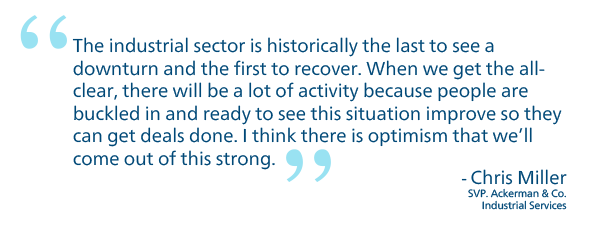During Atlanta’s post-recession economic boom, its industrial market posted some of the strongest numbers in the nation, registering positive absorption for nearly nine years in a row.
Along with a thriving economy, Atlanta’s low business costs, extensive transportation infrastructure, and one-day access to the fast-growing Southeast ports seemed to have the industrial sector positioned to continue the positive momentum.
Of course, the ongoing coronavirus emergency has changed the landscape for the industrial sector, along with every other property type. But there are signs that the impact on the industrial real estate may be less severe.
A strong foundation
As one of the nation’s most important distribution hubs, Atlanta has continued to attract major e-commerce operations along with a full range of consumer goods companies and logistics providers.
The Atlanta market’s major lease deals in the past six months include Amazon’s 2.8 million-square-foot distribution center in Stone Mountain and its 1 million-square-foot lease in Newnan, Ga.
Other big deals and projects include Goodyear Tires’ 1.5-million-square-foot build-to-suit project in Newnan, Ga. Online personal styling service Stitch Fix leased 925,800 square feet in the I-20 West/Douglasville submarket, while XPO Logistics leased 673,818 square feet in the Airport/South Atlanta submarket and SBS Transportation leased 517,500 square feet in Palmetto, Ga.
The surging demand for industrial space in Atlanta led investors to ramp up new construction, which currently totals approximately 19 million square feet, according to CoStar. Vacancy levels as of mid-April remained low at 6.4% and the overall rental rate was $6.16, a 6.4% increase from the previous year.
What’s next?
Those numbers don’t yet reflect the changes taking place throughout the economy. The big question now is: How much will industrial demand be impacted by the COVID-19 crisis?
“You’ve got your recession-proof types of businesses – companies needing refrigeration for food products and manufacturers of essential goods. And, of course, there continues to be strong demand from e-commerce companies like Amazon,” said Chris Miller, Senior Vice President in Ackerman & Co.’s Industrial Services group.
In addition to Amazon, other e-commerce retailers are experiencing skyrocketing sales due to the millions of Americans who have turned to online shopping to purchase everything from health products and clothing to toilet paper and canned foods. There could also be a long-range movement toward the on-shoring of manufacturing due to disruptions in the supply chain for products such as pharmaceuticals.
However, there are definitely issues of concern. Cargo volumes at the Port of Savannah, now the nation’s third-busiest container port, declined by nearly 20 percent in March following a lengthy period of record increases. In addition, the retail shutdown that has spurred widespread layoffs will also impact demand levels, although the extent is not yet known.
Even so, CoStar expects fundamentals to stay afloat. Based on Oxford Economics forecasts, CoStar currently anticipates that – even in a severe downside scenario – Atlanta industrial vacancies will likely remain below the market’s long-term historical average.
“Deal volume through the first quarter was roughly equal to the metro’s quarterly average. We expect deal volume to slow, but CoStar clients remain active in sourcing and performing due diligence on deals during the crisis,” said David Kahn, Managing Analyst at CoStar, in a recent video report. “If the situation improves in the coming months, it wouldn’t be surprising to see an uptick in transaction activity in the second half of 2020.”
Chris Miller echoed that cautiously optimistic outlook.
“The industrial sector is historically the last to see a downturn and the first to recover,” he said. “When we get the all-clear, there will be a lot of activity because people are buckled in and ready to see this situation improve so they can get deals done. I think there is optimism that we’ll come out of this strong.”

